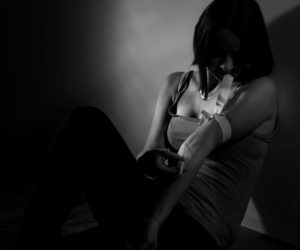Most Common Heroin Abuse Symptoms

Learn how to identify heroin abuse symptoms in order to get your loved one help
Heroin is a powerful opioid drug that is used by millions of people around the world. It is derived from the resin of the poppy plant and it has a very high potential for abuse and addiction. Many individuals in the U.S. who were prescribed opioid painkiller medications became addicted to the drug. When they could no longer obtain a prescription for their medication from their doctor, many moved on to heroin. As an opioid drug, heroin can relieve patients from their chronic, oppressive pain and also get them high. Many people use heroin recreationally because they like the euphoric effects it provides. Some of the most common heroin abuse symptoms can help you identify if someone you know has a heroin abuse or addiction problem.
Visible Signs of Heroin Use
Some visible signs of heroin use are very obvious, such as an addict being “on the nod” which means that the addict falls into a deep sleep because of the sedative effects of the drug. Addicts may fluctuate between wakefulness and sleep and there may be times when an addict becomes heavily sedated while using heroin. This can be a dangerous problem for the addict because this type of sedation can cause a depressed respiratory system where he can stop breathing, a loss of consciousness, coma, overdose and death.
Another visible sign of heroin use is itching and irritated skin because heroin promotes the release of histamines in the body that can cause the allergic effect of itching and skin irritation. Some heroin addicts experience their mouth, hands and feet turning blue, and they may have a depressed heart rate and body temperature. Other signs of opiate use include:
- Sedation
- Infection of the heart valves
- Liver or kidney damage
- A lack of oxygen to the brain
- Muscle and bone pain
- Structural damage to the brain
- A decrease in libido and sexual functioning
The long-term effects of heroin addiction can cause a host of health problems for the addict, and he may become malnourished and weak. Heroin abuse symptoms may also affect the brain and cause psychological and behavioral changes to occur. The National Institute on Drug Abuse reports that addiction to heroin has caused an increase in HIV/AIDS, adverse fetal development, violence, divorce, child abuse, crime and other social problems. The psychological effects of heroin addiction on the addict may include:
- Depression and anxiety
- Memory loss
- Mood swings
- Hallucinations, psychosis and delusions
- Hostility
- Heart, liver and lung problems
- Blood clots
- Seizures
- Death
Psychological signs of opiate use can also include poor attendance and performance at work or school, which can result in the addict being fired from his job or a student being suspended from school.
Heroin abuse symptoms are evident by an addict slowly withdrawing from his family and friends and preferring the company of other drug users or being alone. Many addicts usually become isolated from family and friends and over time may feel extreme loneliness.
Signs of opiate use also include marital and family problems as tensions from the addiction lifestyle affect family members. Everyone in the household is affected when a family member is a heroin addict, and that is why addiction recovery treatment should include family counseling. Children with a parent who is addicted to heroin also suffer the negative effects of addiction. Children may need individual counseling to overcome emotional and psychological damage caused by addiction in the home.
Help is available for anyone who has a heroin addiction problem. The success of recovery may be determined by the addict’s long-term commitment of counseling, therapy and relapse prevention.
If you or a loved one needs help with abuse and/or treatment, please call the WhiteSands Treatment at (877) 855-3470. Our addiction specialists can assess your recovery needs and help you get the addiction treatment that provides the best chance for your long-term recovery.
